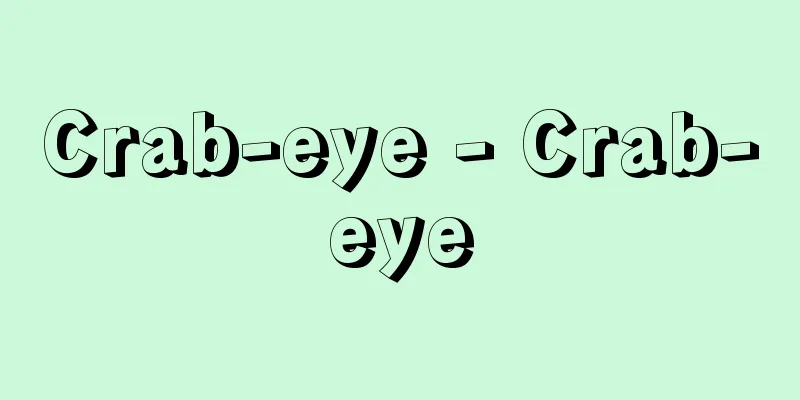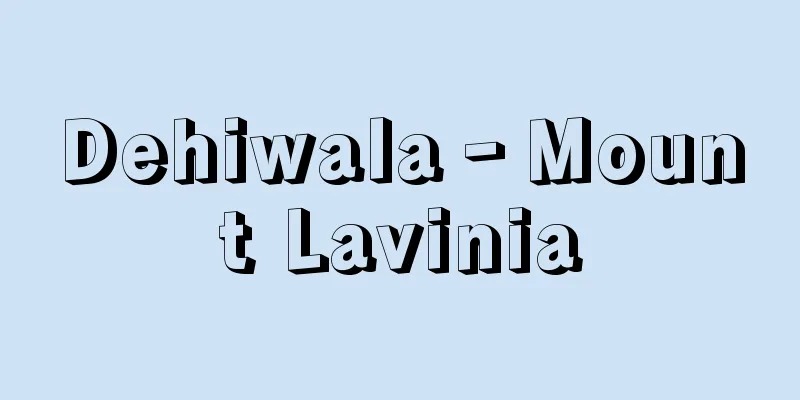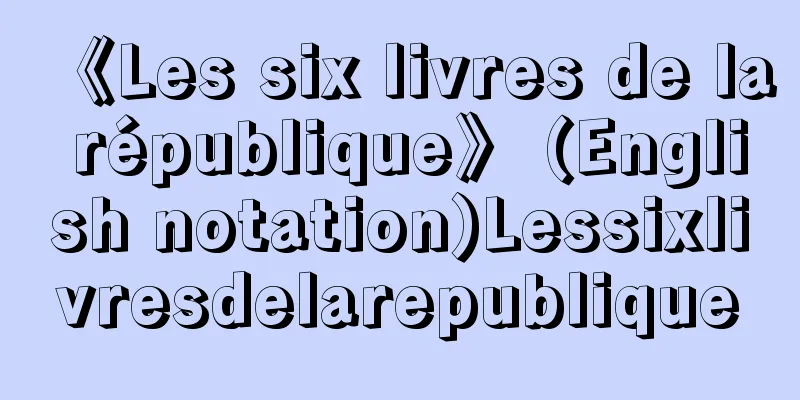Direct democracy

|
A system in which citizens can directly participate in politics by signing petitions and voting, express their will at the national and local political levels, and make decisions regarding legislation and policies. A term that is the opposite of indirect democracy, representative democracy, or representative government, which decides on legislation and policies through parliaments and representatives. [Hiroshi Tanaka] History and ExamplesA well-known example of direct democracy is the popular assembly in the ancient Greek city-state. Because the area and population were small, a so-called "visible government" was possible, and it is thought that a participatory government functioned well. However, in the city-state, only free adult males participated in the popular assembly, and slaves were not given political rights, so the government could not be said to be a fully developed form of democracy like that in modern states. In the Middle Ages, feudal and absolutist states appeared in Western Europe, but in these states the class hierarchy was strictly maintained, and only representatives of the clergy, nobility, and wealthy citizens were able to participate in national politics. Modern states rejected this class system and exalted the principle of popular sovereignty, but adopted representative democracy and representative voting systems for national politics. The reason for this is that modern states have vast territories and huge populations of millions or tens of millions that are incomparable to city-states, and as Rousseau also stated, it was no longer possible to implement "democracy under the oak tree" (direct democracy). However, in order to explain the formation of modern states based on popular sovereignty, Hobbes, Locke, and Rousseau had to develop the idea of a direct democratic social contract in which everyone participates at the time of the establishment of political society and states, but in terms of actual political management, they accepted the adoption of representative democracy by majority vote. Therefore, looking at modern times, there are few cases where direct democracy has been adopted at the national level, such as the referendum held on the establishment of the constitution during the French Revolution, and the plebiscite held by Napoleon I and III as a means of gaining power. However, at the local political level, direct democracy has been used quite a bit, such as the town meetings in America during the founding of the country, the adoption of direct democracy in each canton (state) of Switzerland after 1874, the popular vote on the establishment of the constitution in Massachusetts in 1878 and the adoption of popular votes in other states influenced by this. [Hiroshi Tanaka] Modern states and direct democracyThe Constitution of the Weimar Republic (1919) was the first time that direct democratic provisions were included in a constitution at the national level. The Weimar government, which was established immediately after the German Revolution, was a coalition government centered on the Social Democratic Party of Germany, which originally advocated direct democratic politics in its Eisenach (1869), Gotha (1875), and Erfurt (1891) platforms, and it is believed that many direct democratic provisions were included in the Weimar Constitution. For example, the German president is elected by referendum, the parliament can hold a referendum to recall the president, and half of the electorate can hold a referendum (referendum), and one-tenth of the electorate can initiate laws (initiatives). So why, in the 20th century, did direct democratic provisions such as those found in the Weimar Constitution come to be widely adopted in the constitutions, election laws, local government laws, and so on of various countries? For a while after the establishment of modern states, indirect democracy, associated with parliamentary systems, was claimed to be the best political system. However, from the 19th century onwards, direct democratic ideas began to appear. These were movements calling for universal suffrage. The idea of universal suffrage is of course not in itself linked to a direct democratic political system, but in the sense that it calls for political participation by all citizens, it can be said to be an idea with direct democratic characteristics. Modern states, when first established, advocated the principle of popular sovereignty. However, the reality of their politics was merely an oligarchic parliamentary government, a compromise between the newly ruling upper bourgeoisie and the former landlord class, and the majority of the people were outside the "political world." Rousseau's words in The Social Contract (1762) that "the general will cannot be represented" are usually taken to mean a criticism of representative systems, but as mentioned above, Rousseau also acknowledged that some form of representative system must be used to run the politics of modern states. If so, these words should be understood as an assertion of popular sovereignty as a way to open the way for all citizens to participate in politics and to reflect the will of all citizens in politics. And this assertion is a modern version of the direct democracy of ancient times. Thus, Rousseau achieved the honored position of being the first thinker in modern times to theorize the harmony between indirect (representative) democracy and direct democracy. After this, movements to obtain universal suffrage began in various countries, and at that time, the center of the movement was naturally the middle and lower classes and the working class who did not yet have the right to vote, and the ideological group that most enthusiastically promoted the realization of universal suffrage was socialists. In modern times, the idea of ancient direct democracy was revived in the form of the realization of universal suffrage. So, in modern countries where universal suffrage has been implemented, is the will of the entire nation being adequately reflected in the political world? There are still many problems to be solved on this point. First of all, under the electoral system in capitalist countries, elections are hugely expensive, and national representatives are naturally often chosen from the wealthy classes, making it difficult to reflect the voice of the general public in politics. Secondly, the interests of various classes in modern society have become diverse and complex. Under these social conditions, it is difficult to reflect the diverse interests of the nation in the political world through two to five political parties and through elections held once every four to five years. The adoption of direct democratic provisions would help to resolve these problems facing modern democratic politics. [Hiroshi Tanaka] Direct Democracy in JapanIn postwar Japan, various provisions on direct democracy have been established at the national political level in the Constitution of Japan and at the local political level in the Local Autonomy Act. For example, direct democratic provisions in the Constitution of Japan include the national referendum system required for constitutional amendments (Article 96, Clause 1), the national referendum system for Supreme Court judges (Article 79, Clause 2), and the local referendum system for special laws that apply only to a local government (Article 95). All of these provisions were established with the aim of reinforcing the democratic function of parliamentary politics and curbing the arbitrary actions of the executive branch on issues that require careful consideration in their resolutions. Local governments are the places where politics are most familiar to residents. For this reason, the Local Autonomy Law includes direct democratic provisions that allow residents' will to be directly reflected in politics. For example, Article 12, paragraph 1 provides for the "right to request the enactment, amendment, or repeal of ordinances" (initiative, or citizen proposal), Article 12, paragraph 2 provides for the "right to request an audit of affairs," Article 13, paragraph 1 provides for the "right to request the dissolution of the assembly," and Article 13, paragraphs 2 and 3 provide for the "right to request the dismissal of assembly members, mayors, vice-governors or deputy mayors, election commissioners, auditors, public safety commissioners, and board of education members" (recall, or citizen dismissal). Chapter 5 of Part 2 of the Local Autonomy Law, entitled "Direct Requests," provides detailed provisions on the procedures for exercising the right to direct requests and the procedures that will be followed. [Hiroshi Tanaka] Source: Shogakukan Encyclopedia Nipponica About Encyclopedia Nipponica Information | Legend |
|
国民が直接に署名・投票行動などを通じて政治に参加し、国政・地方政治のレベルにおいてその意志を表明し立法や政策に関して決定できる制度。議会や代表を通じて立法や政策を決定する間接民主制、代表民主制、代議制に対する語。 [田中 浩] 沿革と事例直接民主制の代表的事例としては、古代ギリシアの都市国家における民会が有名である。ここでは地域的規模も小さく、人口も少なかったから、いわば「見える政治」が可能であり、全員参加の政治がうまく機能しえたものと考えられる。しかし、都市国家においては、自由民の成年男子だけが民会に参加し、奴隷には政治的権利が与えられていなかったから、その政治も現代国家におけるような完成された形での民主政治とはいえなかった。 中世になって、西ヨーロッパ地域に封建国家や絶対主義国家が登場したが、これらの国家では身分制階層秩序が厳格に守られていたから、国政に参加できたのは、僧侶(そうりょ)・貴族身分、富裕な市民層の代表に限られていた。近代国家は、この身分制度を否定し、国民主権の原理を高く掲げたが、国政については、代表民主制、代議制を採用した。その理由は、近代国家は都市国家とは比較にならないほどの広大な領域と数百万、数千万という巨大な人口を擁していたから、もはや、ルソーも述べているように「樫(かし)の木の下の民主主義」(直接民主制)を実施することはとうてい不可能であったためである。ただ、国民主権主義を前提とする近代国家の成立を説明するためには、ホッブズ、ロック、ルソーも、政治社会・国家の設立時における全員参加という直接民主制的な社会契約の思想を展開せざるをえなかったが、実際の政治運営に関しては、多数決による代表民主制の採用を認めているのである。したがって、近代以降についてみれば、フランス革命期に憲法制定に関して国民投票(レファレンダム)が実施され、あるいはまたナポレオン1世や3世が政権獲得の手段として人民投票(プレビシット)を行ったような事例があるが、国政レベルでは直接民主制が採用された事例は少ない。しかし、地方政治のレベルでは、建国時代のアメリカにおけるタウン・ミーティング、1874年以後のスイスの各カントン(州)における直接民主制の採用、78年のマサチューセッツ州における憲法制定に関する国民表決(投票)とそれに影響された他州における国民表決(投票)の採用などのように、かなり直接民主制が活用されているのをみる。 [田中 浩] 現代国家と直接民主制国政レベルで直接民主制的規定が初めて憲法に盛り込まれたのはワイマール共和国憲法(1919)においてである。ドイツ革命直後に成立したワイマール政権は、ドイツ社会民主党を中心とする連立政権であり、もともと社会民主党は、アイゼナハ(1869)、ゴータ(1875)、エルフルト(1891)綱領などにおいて直接民主制的政治を掲げていたこともあって、ワイマール憲法に直接民主制的規定が多数盛り込まれたものと思われる。たとえば、ドイツ大統領は国民投票によって選出され、議会は大統領を解職(リコール)するために国民投票にかけることができ、また有権者の2分の1で国民投票(レファレンダム)、同10分の1で法律発案(イニシアティブ)ができるなどの規定がそれである。 ではなぜ、20世紀に入って、ワイマール憲法にみられるような直接民主制的規定が、各国の憲法、選挙法、地方自治法などに広範に採用されるようになったのか。近代国家成立以降しばらくの間は、間接民主制が議会制の名と結び付いて最良の政治制度であると主張された。しかし、19世紀以降、直接民主制的な考え方が登場してきた。それが普通選挙権を要求する運動である。普通選挙権という考え方は、それ自体ではもちろん直接民主制的政治システムと結び付くものではないが、それが全国民の政治参加を求めているという点において、その思想は直接民主制的な性格をもった思想であるといえよう。 近代国家は、その成立当初において、国民主権主義を掲げていた。しかし、その政治の実態は、新たに支配層となった上層市民階級と旧地主階級との妥協の産物である寡頭制的な議会政治にすぎず、国民の大多数は「政治の世界」の局外に置かれていた。ルソーが『社会契約論』(1762)のなかで、「一般意志は代行できない」と述べていることばは、普通は代議制批判を意味するものとされているが、前述したようにルソーも、近代国家の政治運営に際してはなんらかの代表制システムによらなければならないことは認めている。とすれば、このことばは、全国民に政治参加の道を開き、全国民の意志を政治に反映させる方法としての人民主権論を主張したものと解すべきである。そしてこの主張こそ、古代における直接民主制の近代版といえないだろうか。 こうして、ルソーは、近代において初めて、間接(代表)民主制と直接民主制の調和を理論化した思想家としての栄誉ある地位につく。これ以後、各国において普通選挙権獲得の運動が始まるが、その際、運動の中心となったのは、当然に、いまだ選挙権をもたない中小市民層や労働者階級であったし、また普通選挙権の実現をもっとも熱心に推進した思想グループは社会主義者たちであった。古代直接民主制の思想は、近代においては、普通選挙権の実現という形で復興されたのである。 では、普通選挙権が実施された現代国家において、全国民の意志は十分に政治の世界で反映されているだろうか。この点については、なおさまざまな問題が残されている。まず第一に、資本主義国家における選挙制度の下では莫大(ばくだい)な選挙費用がかかり、国民代表は当然に富裕者階級から選出されることが多く、一般大衆の声を政治に反映させることはむずかしい。次に、現代社会においては諸階層の利益は多様化し複雑化している。こうした社会状況の下では、2~5程度の政党を通じて、また4~5年に一度行われる選挙を通じて、国民の多種多様な利益を政治の世界に反映させることは困難である。直接民主制的規定の採用は、こうした現代民主政治の抱える諸問題を解決する一助となるであろう。 [田中 浩] 日本の直接民主制戦後日本においては、国政レベルでは日本国憲法、地方政治レベルでは地方自治法のなかに、さまざまな直接民主制的規定が設けられている。たとえば、日本国憲法における直接民主制的規定としては、憲法改正に際して必要とされる国民投票制(96条1項)、最高裁判所裁判官に対する国民審査制(79条2項)、一つの地方公共団体のみに適用される特別法に対するその地方公共団体の住民投票制(95条)などがそれである。いずれも、その議決について慎重な配慮が必要とされる問題について、議会政治の民主的機能を補強したり、行政部の専権的行為を抑制する目的で定められた規定である。 地方公共団体は、住民にとってもっとも身近な政治が行われる場である。このため、住民の意志が直接に政治に反映できるような直接民主制的規定が地方自治法のなかに盛り込まれている。たとえば、第12条1項の「条例の制定または改廃の請求権」(イニシアティブ=国民発案)、第12条2項の「事務の監査請求権」、第13条1項の「議会の解散請求権」、第13条2項・3項の「議員・長・副知事もしくは副市町村長・選挙管理委員・監査委員・公安委員・教育委員の解職請求権」(リコール=国民解職)などがそれである。同法第2編第5章「直接請求」では、直接請求権行使の手続やその処置について詳細な規定がなされている。 [田中 浩] 出典 小学館 日本大百科全書(ニッポニカ)日本大百科全書(ニッポニカ)について 情報 | 凡例 |
>>: Direct cost, indirect cost
Recommend
Library of Congress - Parliamentary Library
Libraries attached to parliaments. They can be tra...
Yuwen Maozhao - Ubunbosho
...It contains 26 volumes of the annals, 1 volume...
Damascening
… [Katori Tadahiko] [Western] In the West, engrav...
Hornussen
…Other medieval jousting games include the Bavari...
Basic rock - Basic rock
When igneous rocks are classified based on their ...
Andaman Sea - Andaman Kai (English spelling)
It is part of the northeastern Indian Ocean and ha...
Old age pension - roureinenkin
A pension paid to elderly people over a certain a...
Coastal iron sand
…Iron minerals, which make up 1-2% of igneous roc...
Clavulinopsis fusiformis (English spelling) Clavulinopsis fusiformis
...They are found widely throughout Japan and the...
Burberry - Burberry (English spelling) BURBERRY
A British fashion brand. Founded in 1856 by Thomas...
Meridian passage - Shigosentsuuka
The diurnal motion of the celestial sphere causes ...
phocomelia
...This drug was widely used around the world, an...
Inkstone - Kyoken
...A tool for making ink. It can also be written ...
Jacob
A figure in the Old Testament. Also called Israel,...
Io (English spelling)
Io is one of the four major moons of Jupiter disco...









